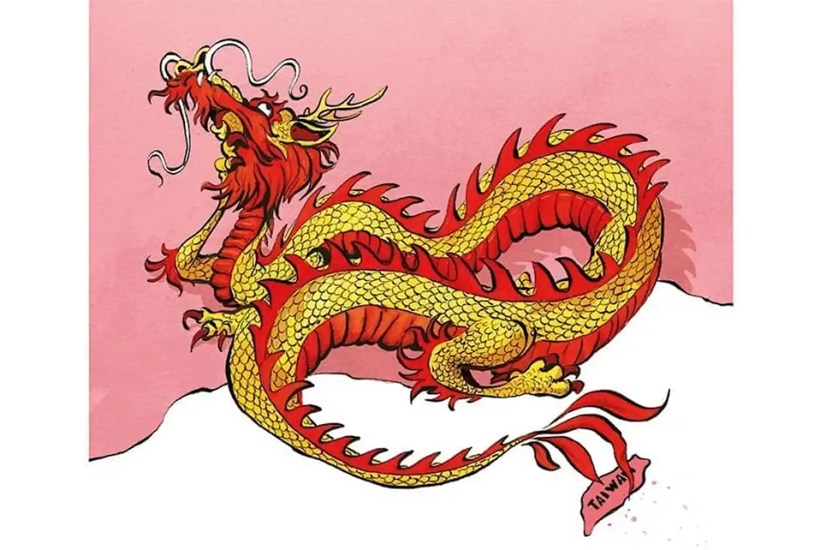During a recent trip to Taipei, I sat down with several retired Taiwanese national security officials to talk about the possibility of war with China. Their responses were sobering: most agreed an outright war is likely this decade or in the early 2030s – whenever Beijing thinks it can outmuscle the US and Japan. They wanted the world to know the situation’s severity. ‘I lived to see Taiwan’s rise,’ one elder statesman told me. ‘Now I fear I will live to see its fall.’
Officials in the Pentagon are laser-focused on the western Pacific. They see Vladimir Putin as little more than a distraction. Senior US Navy officials, such as the chief of naval operations Admiral Michael Gilday, have warned war could come this year. The Marine Corps, too, is retraining: the last US war was a counterinsurgency in the desert, the next one is likely to be an island battle in the Pacific.
The noises coming from Beijing suggest these fears aren’t misplaced. On Monday, Xi Jinping, who will visit Putin in Moscow next week, pledged to build China’s military into a ‘great wall of steel’. China’s navy, already the largest in the world, is rapidly growing in scope and sophistication; it’s expected to have 400 ships by 2025 (America has fewer than 300, Taiwan just 26).
Xi has instructed his advisers to give him the military capability to take the island by 2027. It’s unlikely he has a specific timeline for an invasion, but that doesn’t mean he isn’t preparing for every contingency. Last week, China’s foreign minister Qin Gang warned: ‘If the United States does not hit the brake… no amount of guardrails can prevent derailing and there surely will be conflict and confrontation.’ His words are matched with policy: China will increase defence spending this year by 7.2 per cent – the fastest rise in four years – to $225 billion. It’s also scaling up its nuclear arsenal, with Russian help.
The West’s most coherent response so far is the Aukus defence pact. This week, it was announced that the US is to work with Britain and Australia on nuclear submarines. The Aussies will buy UK-made ones, which will be built on a doubled schedule – two subs every three to four years rather than one. Meanwhile, UK nuclear submarines will help run patrols in the Pacific. China vehemently opposes Aukus: a foreign ministry spokesman has accused the three countries of acting with ‘Cold War mentality’.
If China successfully invades Taiwan, it would enjoy a geographic springboard to threaten Japan and the Philippines and project its naval power far into the Pacific. The East China and South China seas, through which the world’s most important shipping lanes pass, would become de facto Chinese lakes, giving Beijing political and military supremacy over the world’s most populous and fastest–growing geographic region. That’s why Rishi Sunak called China ‘the biggest state-based threat to our economic security’.
North Korea, Iran, Russia and other adversaries of the West would be likely to pounce on American weakness and pick fights with their regional rivals in Asia, Europe and the Middle East; crises would multiply. If Washington abandons Taiwan, it would be trading global order for global disorder. As Taiwan’s President Tsai Ing-wen puts it: ‘[Taiwan stands] at the vanguard of the global defence of democracy.’
Yet war over Taiwan would be devastating too. Setting aside the risk of nuclear escalation, an armed conflict would destroy Taiwan’s manufacturing base, which produces 90 per cent of the world’s advanced semiconductor chips, the lifeblood of the global economy. Washington would rather demolish Taiwanese chip-making facilities than let them fall into the hands of China (and perhaps their Moscow and Pyongyang partners), but if Taiwan’s chip facilities were destroyed or disrupted, the supply chains of everything from cars to iPhones would be wrecked. A huge financial crisis would follow.
As part of its upcoming semiconductor strategy, the British government is war-gaming this scenario. There are fears a blockade of Taiwan could even cause the UK’s internet infrastructure to shut down. According to Bloomberg, which has seen a leak of the strategy, national defence would be at risk, as chips are fundamental to virtually all military systems, including the UK’s F-35 fighter jets, while civilian equipment such as the NHS’s MRI scanners would also be threatened. Britain’s energy sector, too, would suffer.
To the dismay of western officials, Taiwan itself isn’t doing much to bolster its defences. Last year, it increased mandatory conscription from four months to a year. Yet its military remains beholden to largely symbolic prestige assets such as the Indigenous Defense Fighter war planes. Taiwan isn’t moving fast enough to roll out swarming drones and anti-ship cruise missiles which could more effectively sink a Chinese fleet. Its army stands at 163,000 active soldiers – compared with China’s two million. Elbridge Colby, a former Donald Trump administration official, has suggested Washington should sanction Taiwan unless its defence spending increases.
Yet as one official close to the Taiwanese government told me, if Xi is committed to attacking, no capability Taiwan could realistically acquire would make a difference. If Taiwan tried to obtain game-changing capabilities – such as nukes – it would guarantee an overwhelming pre-emptive attack.
Deterrence, though, is as much about psychology as it is about who has the most powerful army. Beijing wants to avoid a wider war against the US and its allies, except as a last resort, and still believes time is on its side. Xi has set the goal of ‘national rejuvenation’ by 2049. The more China is convinced it’s on track to achieving this in the more distant future, the more easily it can be deterred from striking now. Indeed, if Beijing thinks Washington and its allies would defend Taiwan today, but might not in the future, it will wait for its adversaries to stumble or splinter.
That means the key to keeping the peace isn’t only what Taiwan or the US do, it’s also about the actions of the rest of the world – especially regional powers such as Japan, Australia, the UK, South Korea, Singapore and the Philippines. Unlike the US, these countries don’t have an intrinsic interest in keeping China down. Their interest is in preventing a financial crisis and a third world war. They don’t need to commit to defending Taiwan, but they should co-ordinate intelligence and diplomacy, so there’s enough pressure on Washington and Beijing to respect each other’s red lines.
The UK can be an important player in the Indo-Pacific, but Aukus alone isn’t enough. The submarines that the UK and Australia are building together won’t be deployable until the 2040s. In the short term, the UK should expand military and intelligence co-operation with the regional players. It should also align with partner countries to warn Beijing there will be a devastating price to pay if it invades Taiwan.
The UK must also move faster to integrate its defence strategies with allies in the Pacific. In January, the government signed an agreement with Japan which allows the two countries to deploy forces in each other’s territories. As part of the agreement, their militaries will work together on planning and delivering complex military exercises. Japan already has such a deal with Australia and is negotiating one with France (which has many useful Pacific islands). Japan and the Philippines also recently signed a defence agreement which will allow Japanese troops to be deployed there and expand port calls and aircraft visits. The Philippines is a lynchpin of Taiwan’s defence and should be a priority focus for UK diplomacy.
The UK and others can also reassure Beijing they don’t support full independence for Taiwan, and publicly call out America when it recklessly steps close to China’s red lines. America’s former secretary of state Mike Pompeo last year called for Taiwan to have a United Nations seat. This might play well with some of the Republican base in the US, but it’s the kind of provocation that could trigger war. In the future, the UK and Australia may need to remind American politicians that if they spark a crisis with gratuitous provocations, they shouldn’t assume ally support if China lashes out in response.
In a speech last week, Xi offered a pithy statement to help his Communist party comrades navigate this challenging time. ‘Be calm. Stay determined,’ he said. ‘Seek progress and stability. Be proactive and achieve things. Unite – and dare to struggle.’ China hasn’t waged war since invading Vietnam in 1979. This could be about to change. The UK and every other country with a stake in keeping the peace should, for once, make Xi’s credo their own.
Got something to add? Join the discussion and comment below.
Get 10 issues for just $10
Subscribe to The Spectator Australia today for the next 10 magazine issues, plus full online access, for just $10.
You might disagree with half of it, but you’ll enjoy reading all of it. Try your first month for free, then just $2 a week for the remainder of your first year.














Comments
Don't miss out
Join the conversation with other Spectator Australia readers. Subscribe to leave a comment.
SUBSCRIBEAlready a subscriber? Log in